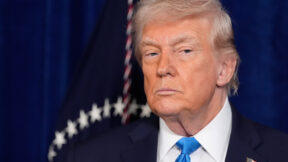Trump Is Normalizing Authoritarianism By Meme — And Dems Keep Taking the Bait

Screenshot
President Donald Trump is not just serving as commander in chief. He’s also running a content studio.
This week, he bragged about extrajudicially killing alleged cartel members on a boat in the Caribbean — a boast that landed less like a policy declaration than a deleted scene from Narcos. Then he doubled down with an AI-generated photo of himself as Robert Duvall’s Colonel Kilgore in Apocalypse Now. Aviators, chiseled jaw, the whole bit. It was either shamelessly embarrassing or hilariously over the top, depending on one’s perspective.
The responses were predictable. Democrats expressed horror, editorial boards muttered about the rule of law, and the rest of us were left to wonder if the former president was joking, bragging, confessing, or all three.
But focusing on whether he’s serious misses the point. Trump’s genius — if you can call it that — is in making extremism feel unserious.
This is authoritarianism by way of irony. The more absurd the packaging — the memes, the cosplay, the AI warlord avatars — the easier it is to shrug. It’s only a joke, only a post, only Trump being Trump. And while his critics scream that democracy is under siege, he turns their outrage into proof that they lack a sense of humor, or worse, are unpatriotic by his very narrow and Archie Bunker style point of view.
The danger isn’t that no one takes him literally. It’s that enough people take him half-seriously, which is more than enough.
Think about it: if a sitting or former president had once openly bragged about extrajudicial killings, it would have been a constitutional crisis. Look at Senator Rand Paul’s reaction to Vice President JD Vance’s defense for a rare and brave Republican reaction. Under Trump, it’s just another Tuesday, just another scroll. He has managed to turn deadly serious matters into consumable content. War crimes, but make it meme-able.
Democrats, in this ecosystem, are the straight men in his vaudeville act. They treat every provocation as if it were the Reichstag fire. They rush to Twitter, cable news, and donor emails with grave warnings. And in doing so, they reinforce his central narrative: that he is the one figure standing against an establishment that can’t take a joke, can’t take a punch, can’t take him.
But they are not to blame in this broader dynamic. It’s like blaming a beaten child for an abusive parent. There is much deeper rot. The outrage doesn’t just fuel him; it camouflages him. Every news cycle spent on AI cosplay is a news cycle not spent on the substance — on the bodies in the Caribbean, on the structural corrosion of American norms, on the very real ways he bends institutions to his will. Outrage becomes smoke, obscuring the fire.
Yes, some might also see a “boy who cried wolf” problem. When every tweet is treated like Armageddon, the distinctions blur. Dumb trolling, authoritarian threats, and genuine abuses of power all get flattened into the same breathless coverage. Over time, the public tunes out, unable to tell when the sky is actually falling. Trump understands this better than anyone. He’s not hiding the ball. He’s juggling it.
What he has invented — and this may be his most lasting political innovation — is a form of authoritarianism that doubles as entertainment. Dictatorship as a binge-worthy series. The plotlines are ridiculous enough to keep audiences hooked, but threaded with just enough menace to keep them afraid. You don’t change the channel, because you don’t know if the next episode will be farce or tragedy.
So yes, Democrats are right to be horrified. But they might also be wise to reconsider their role, or reaction to, this production. Trump is not simply trolling for attention; he is staging a morality play in which their outrage is the essential prop. He thrives on condemnation. What he cannot abide is irrelevance, or worse, being mocked on terms not of his choosing.
The problem is, there’s no obvious countermove for Trump’s critics. Outrage makes a certain amount of sense — he is, after all, bragging about extrajudicial killings — but outrage also feeds the spectacle. Ignore him and he looks unchecked; engage him and you become a supporting character in his show.
Gavin Newsom has experimented with meeting Trump on his own turf, posting sharp-elbowed, performative social content that reads like parody. But the irony is too arch, too self-aware, and mostly lost on audiences who don’t follow the in-joke. In the end, it just feels like more noise in an already deafening feedback loop.
History doesn’t repeat, but it often rhymes. And in this case, the rhyme sounds a lot like laughter — the laughter of an audience watching authoritarianism dressed as satire, deadly serious beneath the slapstick. Trump has turned politics into spectacle. The only question is whether the rest of us will keep mistaking it for entertainment.
This is an opinion piece. The views expressed in this article are those of just the author.
New: The Mediaite One-Sheet "Newsletter of Newsletters"
Your daily summary and analysis of what the many, many media newsletters are saying and reporting. Subscribe now!






Comments
↓ Scroll down for comments ↓